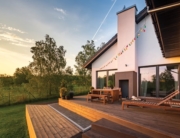With rising house prices, is buying off-the-plan for capital growth a good idea? When it comes to property investing, or any investment, there’s no such thing as a free lunch. You need some good property investment advice before outlaying your dollars in Newcastle.
AMP Capital’s Dr Shane Oliver suggests going in with your eyes open.
Reasons to buy off-the-plan
Benefits can exist in buying off-the-plan if you do your homework and are not buying at the top of the market.
First-home buyers can potentially get into the market and for investors it’s not a bad way to build a portfolio, particularly if buying at a discount.
- Potentially pick up a bargain
- To get a bank loan, developers often have to show interest in the property. They also like a degree of certainty before starting the development, and they’ll try selling a number of properties off-the-plan. You may be able to get a good price and may only need a small deposit, like 10% or so. Depending on your lender, you may not need a deposit if you guarantee the property against other assets.
- First-home buyer advantage
- Benefits of buying off-the-plan vary state to state and can depend on whether you’re a first-home buyer. There are stamp duty concessions in most states and if you’re a first-home buyer, you might get a grant if it’s a new development.
- May be other incentives
- Some developers provide short-term rental guarantees to attract buyers. And some allow for custom colour schemes, fixtures, fittings and appliances.
Reasons to think again
It usually means taking more risk than if you buy an established or completed building.
- Unpleasant surprises
- You can’t inspect an off-the-plan property. If something goes wrong during the build—interest rates rise or banks cut back financing—it can create financial problems. Developers can fall over when the market crashes and the building may be completed years later or never get off the ground.
- Check your developer:
- has sound financing
- doesn’t have too much short-term debt
- has a good track record.
And assuming the development is finished, it:
- may not be what you thought – and getting the developer to fix defects could be hard
- might be harder to rent despite seemingly attractive short-term rental guarantees.
- Better return elsewhere?
- You may pay more up front for established dwellings, but you’re potentially earning rent from day one. Even when you’re earning rent, the net rental yield can be less than you might imagine once you factor in costs. In late 2014, the typical net rental yield was around 1-2%
- Like other investments (aside from cash in the bank), you’re likely to be liable for CGT on selling, assuming there’s a profit.
- Property may fall in value
- If not completed for a while after you agree to buy, you risk it being worth less than you agreed to pay for it.
- Home prices are rising for many reasons, including low interest rates and greater buyer confidence, plus high demand relative to supply.
 Source: ABS, AMP Capital
Source: ABS, AMP Capital
- Although likely to continue rising for a while, there’ll come a time (likely 2015) when the Reserve Bank will start raising interest rates – and this will act as a dampener on the property market.
- The past few years saw two significant downturns when home prices fell on average between 5% and 10%— after the GFC and through 2011-12
- . Riskier developments would have experienced greater falls.
- Before buying off-the-plan ask your adviser for help to understand potential benefits and downsides.
 Contact Brad Lonergan (Financial Planner) for more information on property investment advice Newcastle, financial planning and home loans in Newcastle.
Contact Brad Lonergan (Financial Planner) for more information on property investment advice Newcastle, financial planning and home loans in Newcastle.
0423 621 120 or email at brad@bmkfs.com.au







